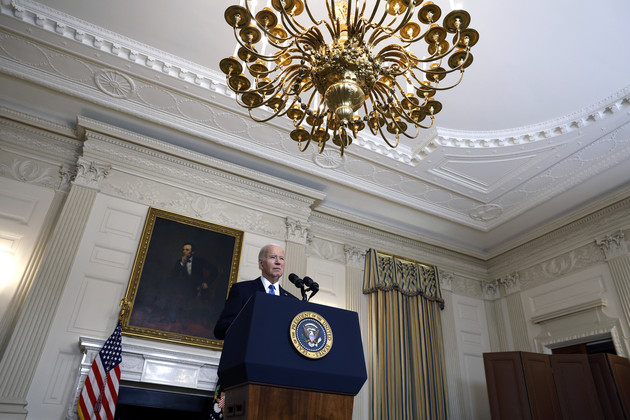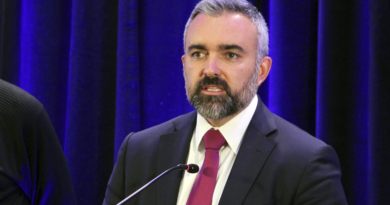Liberals Dreamed of This Economy For Decades. What If Voters Don’t Like It?
Higher wages, higher growth, higher productivity. Win-win-win.
There’s a chance we’re headed down that exact path, and yet, Americans don’t seem very enthused.
Because they really hate inflation.
For the coalition that has supported this agenda — Democrats to the left of Larry Summers, along with economists representing a range of ideologies — the economy today is a policy success more than a decade in the making. And the fact that it hasn’t yet translated into political success is a worrying challenge for them and President Joe Biden.
Rather than enjoying a victory lap, the people who oversaw this recovery — in the administration, the Fed, Congress and the worlds of academia and economic think tanks — are being asked to explain the disconnect between the economic data and the polling.
“There’s a healthy amount of fear and introspection happening among the architects of these efforts that folks aren’t necessarily buying what we’re selling,” one prominent progressive policy advocate told me. “And folks are under some pressure about it, too.”
“What are we doing here if we’re not building an economy that people like?”
When the coronavirus pandemic struck, officials were determined not to repeat the slow recovery after the 2008 financial crisis. Congress — first on a bipartisan basis, then along party lines — went big to keep people afloat, then made long-term investments in infrastructure and green energy.
Employment quickly recovered from the Covid recession, and joblessness has been below 4 percent for two years. We saw similar numbers under former President Donald Trump, but it took nine years of economic expansion to reach that point after the last recession. (And before that, the last time unemployment had dropped that low was in the 1960s.)
The Fed also might pull off a nearly unheard of feat: bringing down inflation without pushing the U.S. into recession, as economic resilience has allowed the economy to withstand aggressive interest rate hikes.
These dynamics are at the crux of every piece you read about why consumer sentiment isn’t higher, or why people don’t recognize this is a good economy.
Privately, some administration officials worry that it’s not just reelection that’s at stake, but also the possibility that policymakers won’t be as forceful whenever the next recession comes, for fear of stoking prices. That’s even as officials have become more confident that their approach was the right one.
“There’s a lot of concern that we are overlearning the lessons of the fiscal and monetary policy of this recession,” one official told me.
And Americans’ skepticism about the economy is reasonable. Rent and grocery prices are both up roughly 20 percent in the last three years. Electricity is up more than 25 percent. While wage hikes have been outpacing cost increases for the past year and a half, they still fall short over the course of Biden’s presidency. And the lack of affordable housing in particular looms as a painful reality for millions of Americans — something the White House has acknowledged.
“I don’t think the story here is that the economy is all perfect,” Rep. Andy Barr (R-Ky.) told me. “The overspending that has created the inflation crisis has raised prices for the American people, and the cost of credit is historically high.”
So while inflation has cooled markedly, “the toothpaste is out of the tube.”
Still, surveys of economic sentiment show optimism has been rising and may continue to do so. So, as the election looms in November, the Biden administration and its allies hope that
people get used to the new higher price levels and that positive economic trends, like wages growing faster than prices, last long enough to win over voters.
The conversation inevitably dovetails with unsettled debates around how much blame different factors should get for causing inflation: government spending, messed up supply chains, disruptions to the oil market from Russia’s war in Ukraine, general weirdness as the economy reopened from Covid.
Democrats were willing to tolerate some inflation when they passed the American Rescue Plan in 2021 — perhaps underestimating or forgetting how much people hate rising prices — but they also argue that this particular bout was mostly caused by production and shipping delays, as well as unpredictable shifts in what people were spending money on.
The administration has also put blame on companies for taking advantage of the moment. White House economic adviser Lael Brainard told reporters Thursday that consumer brands and grocery store chains need to bring down their pricing from pandemic-era levels.
Then there are those close to the White House who challenge the basic premise of all this political angst.
Bharat Ramamurti, who served as a top economic aide in the White House until September, disagreed strongly that consumer sentiment should be taken as a referendum on Biden’s economic policies. He pointed to surveys showing that Republicans report feeling worse about the economy than Democrats do, which he chalked up to unavoidable partisanship. (He was far from the only person to make this point.) He also said leaders around the world have had their popularity dinged by high inflation.
Ramamurti firmly believes that the Biden administration — and the larger progressive economic agenda — deserves considerable bragging rights and flatly rejected my assessment.
“In the U.S., the fact that we took a more aggressive approach that led to a faster recovery … has put the president in much stronger standing than a lot of people internationally,” he said. “The idea that, ‘Oh, Democrats instituted a set of policies that they always wanted that ended up producing an extraordinarily fast and highly equitable recovery, and that’s why people are unhappy’ — I don’t think that’s a good reading of the evidence.”
If the government hadn’t stepped in the same way with checks, the expanded child tax credit and more, he said, “we still would’ve had historically high inflation, and everyone would be even more miserable.”
One of the people who has worked the longest in pushing this progressive vision of the economy is Dean Baker, an economist who co-founded the Center for Economic and Policy Research. When I spoke to him this week, he had a frustration of his own: that the left won’t treat a victory as a victory.
“There’s a lot of resistance because people say, ‘We should be pushing further.’ I’m fine with that,” he said. “But if you don’t recognize when you’ve made progress, you’re never going to get anywhere.”




